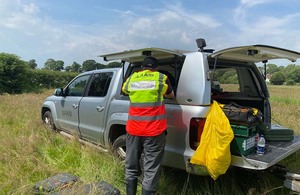Welsh grassroots football facilities receive regeneration funding
-
17 projects to benefit from first tranche of £230 million investment in football facilities across the UK to level up access to quality sport provision.
-
Improvements to be made in partnership with the Football Association of Wales.
Grassroots football facilities across Wales will benefit from an initial £1.3 million of UK Government funding for improvements, as part of a major commitment to levelling up access to physical activity across the nation.
Seventeen projects across Wales will receive funding to create and improve pitches, changing rooms and pavilions, so that more local communities can access high-quality facilities.
Projects have been chosen for their ability to deliver improved facilities in deprived areas, support multi-sport use and increase participation among currently under-represented groups, including women, girls and disabled players.
Examples include Baglan Football Field in Rhondda Cynon Taf, which will receive £100,000 towards converting their grass pitch to 3G artificial grass, improving facilities for the women’s game and catering for the needs of everyone in the community. Over £57,000 has been granted to Ysgol y Grango School Club Hub in Wrexham to provide better facilities for more community clubs. £35,000 will go to upgrading the surface and replacing floodlights at Cae Piod in Ceredigion.
A full list of funded projects can be found here.
The funding, combined with contributions from clubs and other local partners, will improve the quality of community facilities, bring people together to enjoy playing sport in their local area, regenerate communities and enhance social cohesion.
It forms part of a £25 million UK-wide investment in grassroots facilities during this financial year, out of a total of £230 million set to be invested to help to build or upgrade up to 8,000 quality pitches across the UK over the next four years. The funding will also support the construction or refurbishment of clubhouses, changing facilities and community buildings.
The Football Association of Wales is delivering the programme on behalf of the UK Government in Wales. Following the UK Government’s commitment, the Welsh Government has also opted to invest £1.3 million to improve grassroots facilities this year – the FAW is working with both governments to maximise the benefits of this combined investment for local communities.
UK Sports Minister Nigel Huddleston said:
We are committed to improving access to high quality sports facilities for the underprivileged and underrepresented in Wales.
From female changing rooms at Treborth Playing Fields in Bangor to new pitches in Welshpool and Swansea, this will ensure more people can enjoy the physical and mental health benefits of sport at top class facilities in their local community.
Secretary of State for Wales Simon Hart said:
“Grassroots football clubs are at the heart of their communities, providing sporting opportunities but also bringing incalculable health and social benefits to local children and adults.
“They play a hugely important role and I’m thrilled that the UK Government is making this investment in facilities the length and breadth of Wales which will help the clubs and groups receiving this funding to continue their fantastic work.”
The Football Association of Wales is pleased to be working closely with the UK and Welsh Governments to improve facilities across Wales and are grateful for their support.
Improving the facilities across Wales is the FAW’s number one strategic objective. This initial round of funding marks the beginning of an exciting journey, and the FAW will continue to work closely with all of its stakeholders, to create a facilities investment fund in order to deliver impactful projects across all corners of Wales as we strive to make football inclusive and accessible to all.
Today’s announcement follows a joint ‘Expression of Interest’ submitted to UEFA by the Football Associations of England, Northern Ireland, Republic of Ireland, Scotland and Wales on Wednesday (23 March).
The Governments of the UK, Ireland, Scotland and Wales have confirmed their support for the EOI submission and, given the Northern Ireland Executive is currently not meeting formally, officials there continue to observe the process closely.
Formal discussions on the technical specifications for the tournament are expected to take place with European football’s governing body over the coming weeks, before a final decision is made on submitting a formal bid.
On the prospects of hosting UEFA EURO 2028, Sports Minister Nigel Huddleston added:
This is welcome news from the FAs, and the Government remains committed to working closely with them and our partners in the Government of Ireland and the Devolved Administrations to bring UEFA’s flagship festival of international football to the UK and Ireland.
Our unprecedented partnership creates the potential for the best EUROs ever, and we are passionate about bringing another world-leading sporting event here, creating a real celebration of football for people across the UK and Ireland.
The government continues to demonstrate its commitment to sport and recreation, recently announcing that it is also investing £30 million to refurbish more than 4,500 tennis courts across the UK.

